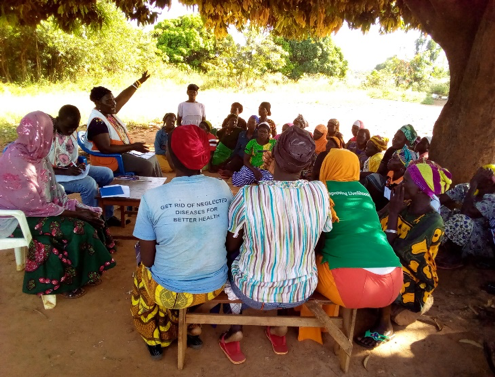
WHAT DID WE FIND?
With over 1.4 million refugees living in settlements across the country, Uganda is the largest refugee-hosting nation in Africa and third in the world. The government’s progressive policy towards refugees provides free health care and primary education in refugee settlements. However, the diffusion of our innovation in the West Nile region of Northern Uganda revealed critical gaps in essential primary health services in refugee communities. This is despite substantial investments by UN agencies over the past ten years and a mechanism for regular coordination among implementing partners.
Our results showed diarrhoea prevalence in refugee children was over 35%, yet only 7.2% of mothers used oral rehydration therapy to treat dehydration. In addition, while more than 94% of refugee households had access to clean water sources and 67% used improved latrines, less than 24% had acceptable hygiene practices (use of soap and water and handwashing at appropriate moments).
Similar contradictions were evident with MNCH services. For example, the completion of four antenatal care visits (81.1%) and coverage of skilled delivery (88.1%) among refugee mothers were both very high. However, the use of maternal postnatal care (2.5%) and neonatal postnatal care (33.5%) was exceedingly low putting mothers and neonates at risk for complications following birth.
These mixed results are just a few of the critical implementation gaps that we measured in Arua and Yumbe districts in West Nile. These findings highlight the urgent need for uptake of our innovation by implementing partners in Northern Uganda to improve recurrent monitoring of the entire West Nile Refugee Response Programme. We believe that building local capacity to use our approach will generate the evidence needed to improve the health system response for both refugee and host communities in Northern Uganda.
INCREASING THE UPTAKE OF OUR INNOVATION
Our innovation is a rapid mixed methods tool for post conflict areas that is designed for humanitarian workers to rapidly monitor programmes and to identify and assess the gaps and barriers to service coverage. Using this tool we worked with our local partner, World Vision Uganda, to carry out a wide-ranging assessment in refugee and host communities in two districts (Arua and Yumbe) in the West Nile Refugee Response Programme. Topics covered maternal, newborn and child health (MNCH), water and sanitation, nutrition, social capital, social protection and household livelihood.
To share our approach and results, we undertook dissemination activities over several months that:
- demonstrated the utility of our innovation and face validity of results;
- established a policy dialogue with key humanitarian organisations and UN agencies to promote future uptake.
At the national level in Uganda, we organised four dissemination meetings in Kampala to share project findings. Here we engaged humanitarian partners and stakeholders in defining policy priorities and decisions related to the coordination and delivery of humanitarian services in the West Nile region. Meetings included presentations with UNICEF, UNFPA, UNHCR, and the full UNHRC Partnership Forum. Working with the humanitarian network in Uganda gave us a ready platform for disseminating the innovation and for fostering policy dialogue to advocate its uptake.
We also prepared a briefing paper and slides in an easily accessible format for wide circulation. These were shared with the UNHCR partnership, USAID, DFID, and the CORE Group. CORE is a member association of over 80 organisations working in community health and humanitarian issues. CORE has agreed to host a webinar on its platform to disseminate our approach and findings among its broad network of humanitarian NGOs and practitioners.
At the community level, we convened a series of eight community feedback sessions (six in refugee villages and two in host communities) in Arua and Yumbe districts. The meetings had broad participation of community members, leaders, and the village health team. The purpose was to share our findings, verify the face validity of our conclusions and solicit feedback from community members. Participants in the meetings agreed that sharing both positive and negative results and giving participants a chance to comment on the findings was a valuable experience that also increased their trust in LSTM. One refugee leader in Arua explained that organisations rarely share results of studies or other data gathering in the settlements:
“Usually they come and take our information and then they never come back."- Refugee Leader, Arua, Uganda
LOOKING AHEAD
Our long-term goal is to take our innovation to scale in the remaining refugee-hosting districts in northern and western Uganda. This vision includes adapting the methods to support implementing organisations to use data for action planning and strategic planning for improving services. Ultimately, we intend for the innovation to be adopted by a critical majority of humanitarian organisations operating in Uganda and also supported by UNHCR as the standard method for recurrent monitoring in humanitarian settings.